In coronavirus fight, workers in ski masks are holding L.A.’s social safety net together
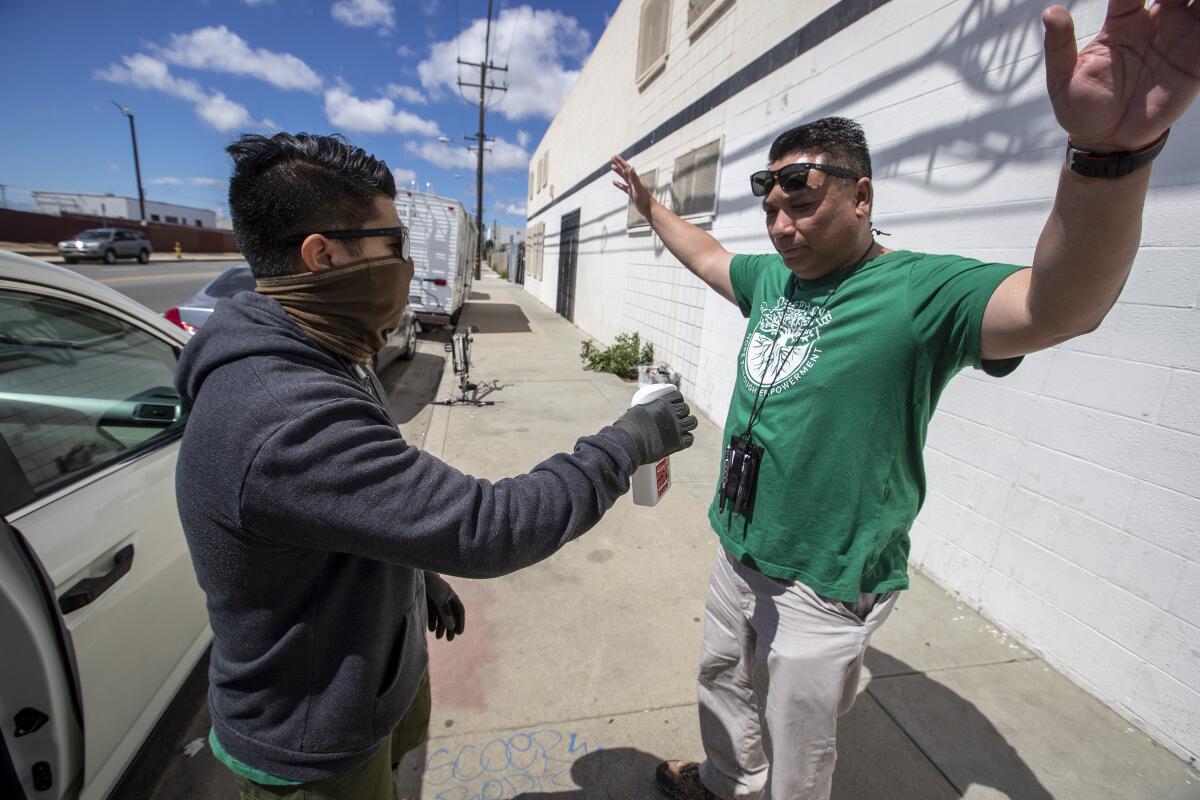
- Share via
They were looking for a man named Wayne who was old and frail and probably hadn’t eaten in a while, putting him in the most vulnerable category for contracting the novel coronavirus.
Homeless outreach workers Christian Riehl and John Cudal had last seen Wayne in his dilapidated RV, which was parked at 135th Street and Broadway in unincorporated Willowbrook.
Riehl had a motel voucher for Wayne and hoped he could persuade him to surrender his RV and go indoors. But when they got to the corner, his RV wasn’t there.
Across the street was another RV, and a disheveled man named Louie answered the door.
“We’ve been sent by L.A. County to make sure that everybody over 65 has a place to stay,” Cudal told him.
With the number of coronavirus cases expected to surge in the coming weeks, Riehl and Cudal were doing some things differently. They wore face coverings — a ski mask for Riehl and neck gaiter for Cudal. They spritzed their clothes and shoes with alcohol after each conversation with a homeless person, and searched out seniors and others who are medically fragile.
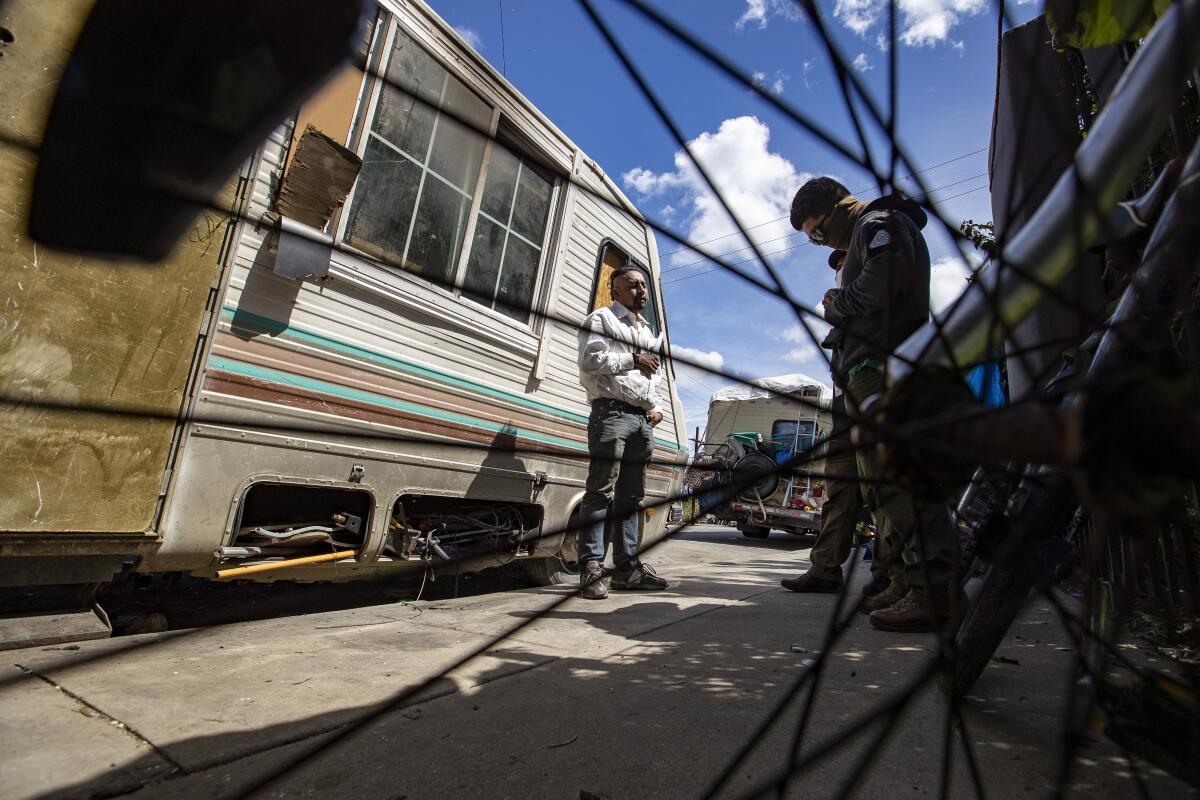
But their mission had not really changed. As outreach workers for St. Joseph Center, Cudal and Riehl exclusively work with homeless people who live in vehicles, so they continued to introduce themselves to the hundreds of RV dwellers in South Los Angeles and help them get services and housing.
While occupied RVs have become a common sight around the county, this stretch of Broadway, where the street is wide and the overnight parking prohibition is not being enforced, has become a linear RV village.
Riehl and Cudal monitor the more than 200 vehicles parked there. Some are mobile; many are broken down. Some look decent; others are patched with cardboard or tarps. A few are owned by people who choose to live on the cheap. Most belong to people who have been beaten down by life, including squatters and tenants in an RV rental black market.
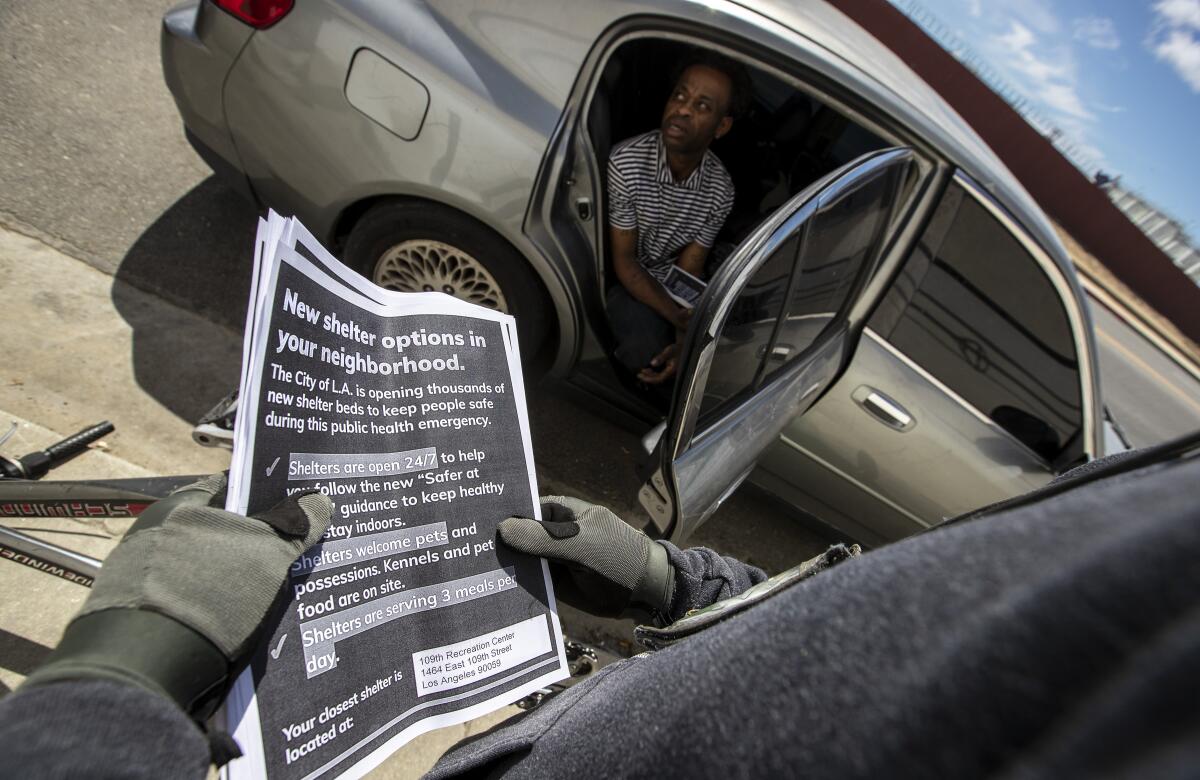
The Vehicle Homeless Outreach Program, funded by Supervisor Mark Ridley-Thomas’ discretionary account, was founded in 2014 to deal with the problem. The current number of RVs and cars is down from the more than 300 when the program began, Riehl said. Those who get housing can keep their vehicles if there is parking available and if the vehicles are still operational. The program pays to tow and dismantle the cars and RVs that no longer run, so they don’t remain on the streets.
The path to success is seldom direct, and for every step forward there is often a step back. Of the 129 people who have qualified for housing, 79 have moved in, four of them this year, according to reports filed with the L.A. County Board of Supervisors.
Louie was new to the neighborhood, he told Riehl and Cudal. He said he had been living in his RV in Lomita for five years until he was asked to move along.
“At least I had a place to be,” he said. “Now they don’t want me.”
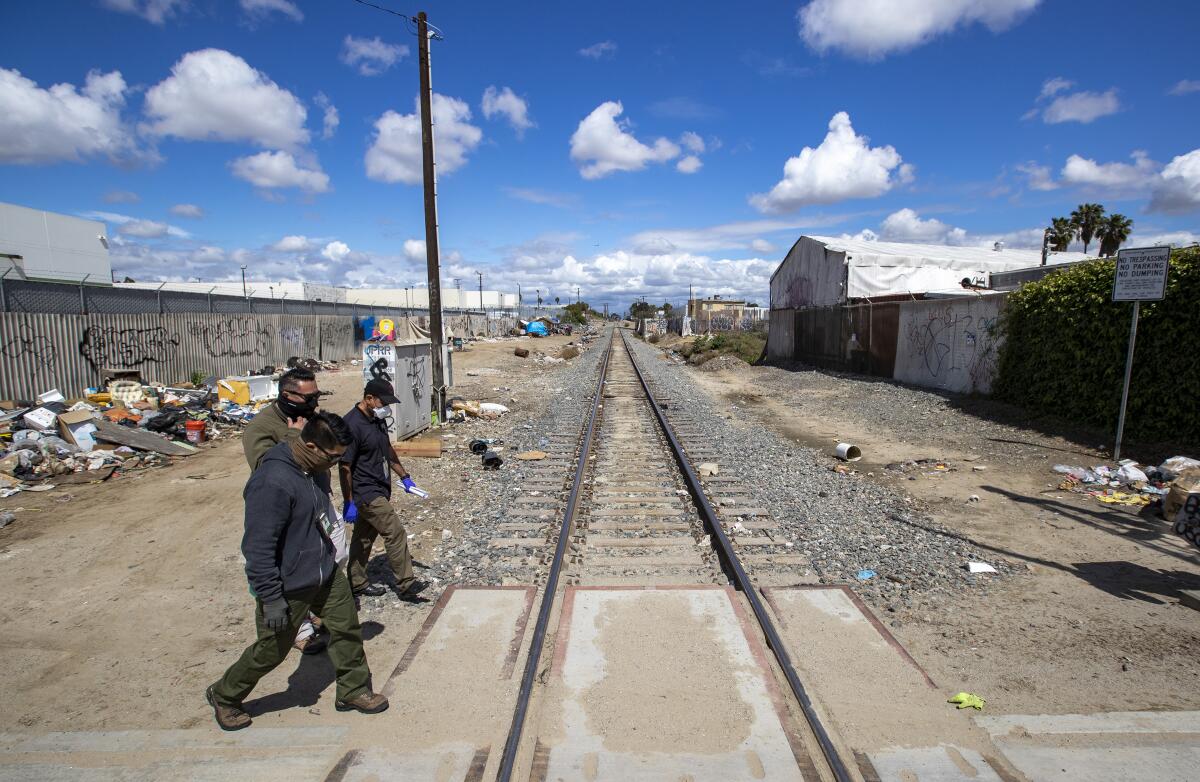
Louie was ambivalent about getting services.
“I just want to make sure you’re good and take care of yourself,” Cudal told him. “If you’ve got that, you got it.”
Riehl and Cudal moved to opposite sides of the street. Cudal, working his way through a thicket of dated electronics, vehicle parts and broken appliances, asked at each door if anyone inside was 65 or older, or ill.
It’s outreach workers who serve as the eyes and ears on the streets, a role that has become even more important as local and state officials have ordered social distancing to slow the pandemic. These workers play the crucial role of connecting homeless people with a rapidly growing list of services and resources, including emergency shelters, hotel and motel rooms, and quarantine facilities.
If Cudal, for example, did come across someone living in an RV with flu-like symptoms, a possible sign of COVID-19, he would have to arrange for a medical team to take that person to one of the quarantine facilities being hastily set up across L.A. County.
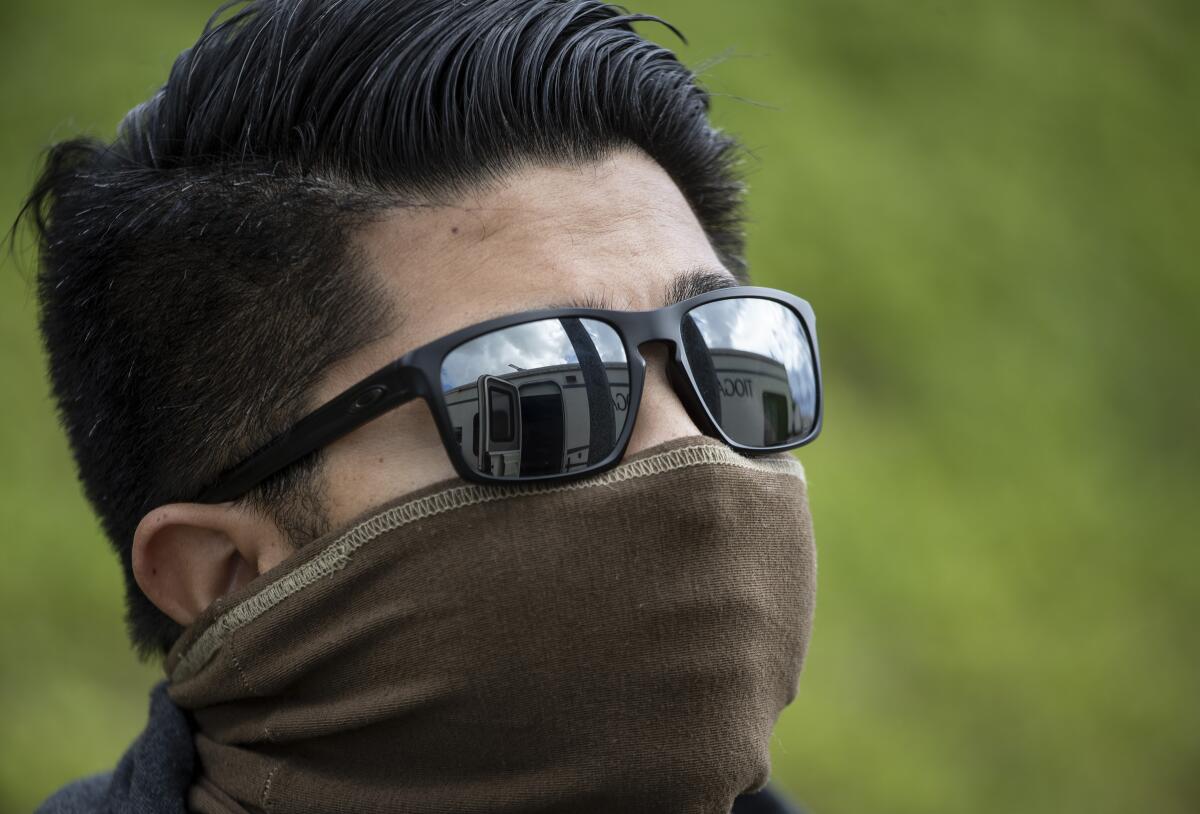
Homeless people who are at high risk for the virus but aren’t exhibiting any symptoms go to motels or shelters, and it’s outreach workers who must call an Uber or a cab to get them there.
Riehl hoped to do that for Wayne, now that he had found him. Riehl made a call, trying to first line up some food, but the cupboards were bare of donations.
“Not even Top Ramen?” Riehl asked in frustration.
He knew where he could scrounge up some food. He said he’d return with it later and try to get Wayne into a motel.
But an emergency suddenly needed the outreach workers’ attention. A sheriff’s deputy had tipped them off about a grandmother, three daughters and two granddaughters who were living in an RV a few miles away on Bandera Street without plumbing or electricity.
Interviewing the women, Riehl and Cudal determined that neither the grandmother or mother was 65 or older, nor did either have a high-risk health condition.
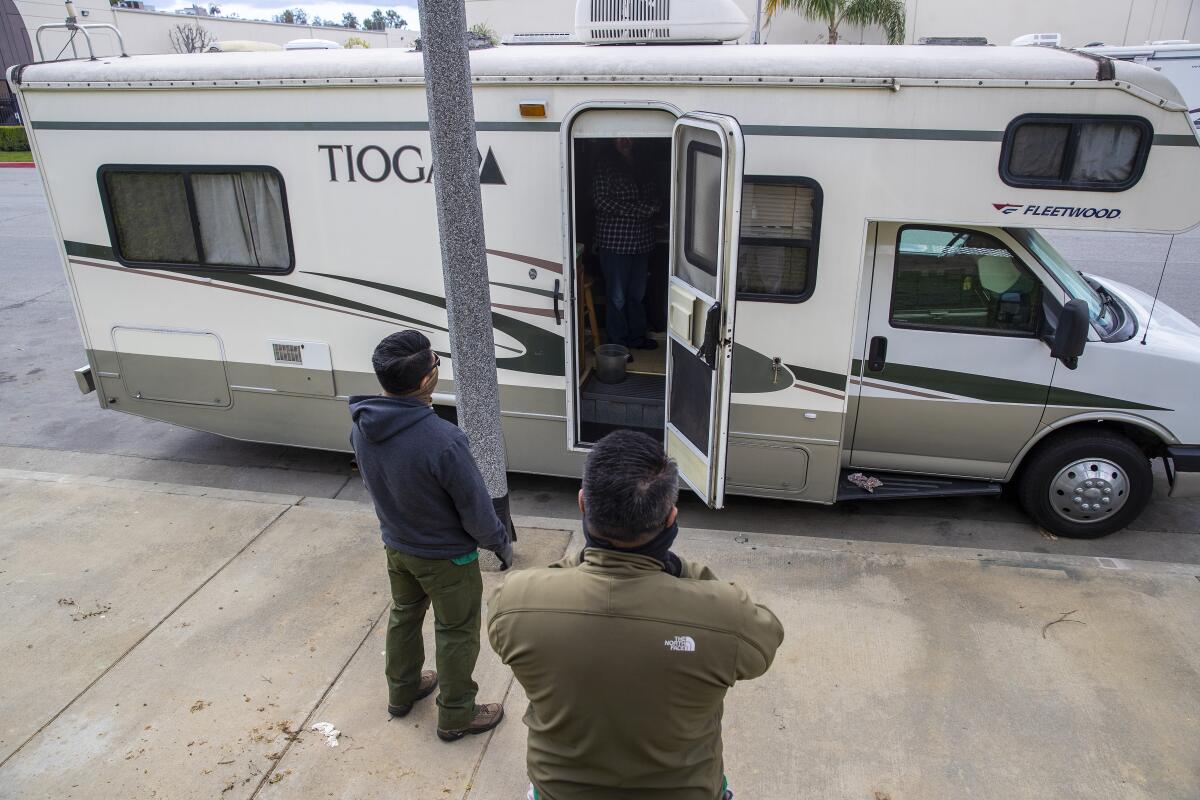
That ruled out Riehl’s first option of moving the family into one of the quarantine trailers at Dockweiler State Beach. Instead, he tried to line up a motel — not a cinch for a family of six.
At the end of the day, Riehl and Cudal had mixed success in their efforts to help those whom they had found.
Wayne took the food but declined the voucher for the motel. An older couple who were in line to get an apartment had a motel room waiting to tide them over but hadn’t checked in yet. And, after securing the help of a housing specialist, the family of six moved into a motel.
More to Read
Sign up for Essential California
The most important California stories and recommendations in your inbox every morning.
You may occasionally receive promotional content from the Los Angeles Times.







